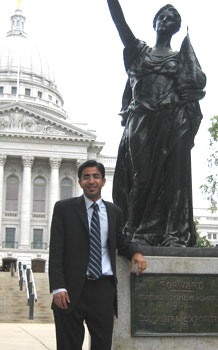HAVERFORD SENIOR EXPLORES INDIA-CHINA RELATIONS AT MAJOR ACADEMIC CONFERENCE

Details
In October, Anirudh Suri '06, a double major in economics and political science, received a rare opportunity for undergraduate students: He joined a panel of distinguished scholars—a professor emeritus from McGill University, a Ph.D. candidate from the University of Ohio, and the head of the political science department at the University of Baroda, India—in presenting papers at the 34th Conference on South Asia at the University of Wisconsin-Madison.
Suri's paper“India-China Relations: Strategic Cooperation or Rivalry in 21st Century?” was based on research he conducted during several internships and a year of studying abroad. In the summer of 2004 he worked at the Carnegie Endowment for International Peace in Washington, D.C. Last academic year, he studied at the London School of Economics. Then, last summer, he received a grant from the Center for Peace and Global Citizenship to travel to Beijing and work with the China Institute of International Studies. Incorporating his research from these experiences, the paper examines the collaborations and conflicts between India and China in three areas: economic, political, and energy-related issues.
In the economic arena, Suri says, India and China are likely to cooperate with each other. Their economies are complementary: India's is based on the services it provides to other countries through outsourcing and its superiority in the realm of information technology, while China's strength lies in manufacturing industrial goods.“As neighbors, their trade levels with each other are low compared to their trade with other countries,” says Suri.“As they realize how much they have to gain from each other, I expect them to be much more cooperative in the future.”
Politically, says Suri,“the picture is not as rosy as some make it out to be.” The border conflicts that have existed since 1962 remain unresolved and China's“all-weather friendship” with Pakistan continues to irk Indian leaders. In addition, as China becomes more and more of a global superpower, the United States supports India to counter China's emergence in Asia and the world. And both countries have similar claims to their roles throughout the continent and globe.
In terms of energy—which has yet to be covered in-depth in other academic writings—both India and China are developing quickly and constantly need oil and other energy sources to fuel their rapid economic growth. They bid for the same oil fields in different countries and pay more than they would if they bid together. Despite this, Suri doesn't see cooperation as likely in the near future:“Oil is a limited resource, and they both need a lot of it. China has been winning all the bids, so there's no reason for it to cooperate with India. The question is, what can India do to convince China that it is in its interest to cooperate?” It makes economic sense, he says, since it will reduce energy costs for both. Also, India's naval presence in the Indian Ocean and the Malacca Straits—a main route for oil to reach China—is second only to that of the U.S., and the two countries could potentially work together to block China's access.“Energy is such a big issue,” says Suri.“If they don't cooperate on this, it will spill over into other sectors of their relationship.”
Suri concludes that relations between India and China will be based on a mix of cooperation and competition.“They both know it's in their interest to cooperate,” he says,“but I don't see them becoming strategic partners anytime soon.”
The economic and geopolitical imperatives for collaboration between India and China are also the subjects of Suri's senior theses. He's currently interviewing for jobs in strategy and economic consulting around the country and at think tanks in D.C. He plans to work for a couple of years and then pursue graduate school, hoping to combine a master's in public policy and international affairs with a J.D. in international trade law. The focus of his studies will continue to be India/China.“I'm very passionate about this relationship,” he says,“and how it will affect the global order.” He is learning Chinese in preparation for his future education.
Suri is also active in Haverford's Student Conference Organizers Committee, which he founded two years ago with friend Nathan Vogel '06. They arrange an on-campus academic conference every spring, receiving funding from various sources: the Center for Peace and Global Citizenship, Students' Council, and the Distinguished Visitors Committee, to name a few.“The students organize everything,” says Suri.“We start planning in October and handle publicity, logistics, and speakers.” March 31-April 1, 2006, the committee will be hosting a conference called“Energy Insecurity: Fuel for Conflict?” Panels will address the geopolitics of oil and energy, the economics of oil and rising prices, and alternative sources of energy.
—by Brenna McBride, staff writer



